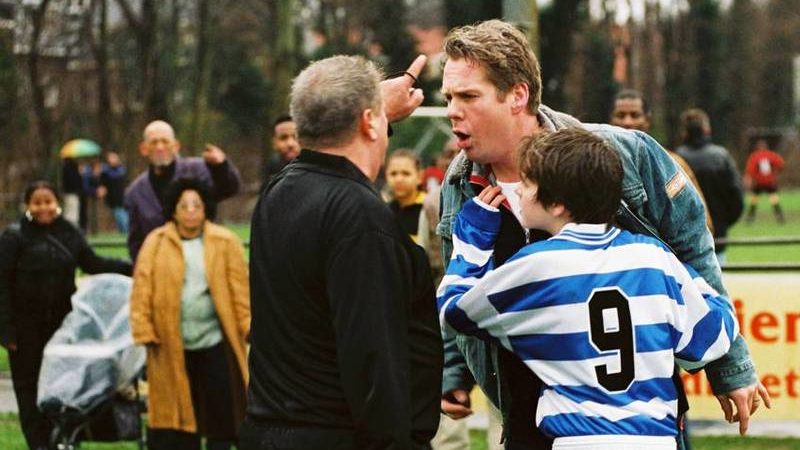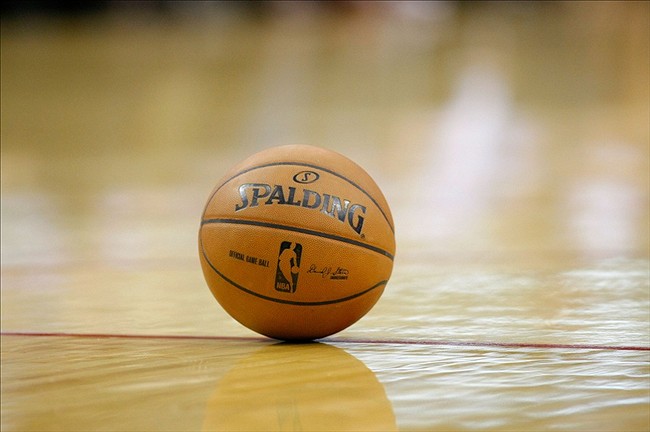‘Compete-Learn-Honor’ enhances mental, emotional training
Every coach needs to establish their own coaching philosophy. I developed mine for our junior varsity tennis team years ago, but the feedback I’ve received is that it’s applicable for all sports.
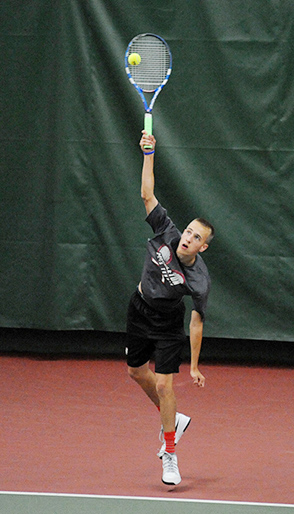 My philosophy is simple: Compete-Learn-Honor.
My philosophy is simple: Compete-Learn-Honor.
That means giving 100% at all times; being an open, curious, humble learner; bringing credit to yourself, your team, family, school and the game you’re playing. If you do that, you’re a winner, regardless of your win-loss record. Of course, we want to win, we train to win, and we compete to win. But we do not measure the success of our seasons by victories. We measure success by whether our athletes grow as players and people of character. If they have, our season was a success, and the Compete-Learn-Honor yardstick helps us know how we’re doing.
I’ve generated about two dozen mental and emotional strengthening slogans — listed in the chart below — that describe habits we develop within our players. We teach these in the reverse order of importance — honor, learn, then compete. Honor is the foundation. It explicitly requires humility, and humility is necessary for learning. It’s learning that allows you to develop the skills and mindsets needed to compete with joy and gratitude.
These Compete-Learn-Honor suggestions only work if players learn to love the game more than how well they play it. They must learn to surrender their ego to the joy and power of playing the game humbly, as a learner, and as a student of the game. If they do these things repeatedly, they’ll strengthen themselves mentally and emotionally.
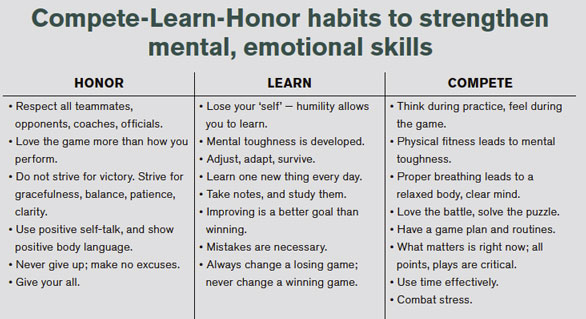
They will also grow spiritually, in the sense of honoring others and the game they play, as well as caring about values and ideas bigger than themselves. How important is this non-religious “spiritual” aspect?
Dr. Jerry Lynch, founder of Way of Champions and psychological advisor to several college and pro teams, said every athlete who wants to “compete with heart” has to have three talents:
- Physical, which most high school athletes have.
- Mental, which Lynch said roughly 40% have.
- Spiritual, which Lynch estimates only 2% of athletes have.
To have the spiritual talent of a champion, coaches need to help their players understand that the highest realization of their potential is found in relationships to others and serving ideas bigger than themselves. It’s about making what you can give to the team a higher priority than what you can get from the team. Former NFL player Joe Ehrmann called it the difference between “being on the team” and “being a teammate.”
» RELATED: The power of mental training for your athletes
Every day, we hang these slogans on the tennis fence on big laminated posters discuss them. Compete-Learn-Honor is up there almost every day, along with one or two other phrases. After warmups, we gather around the posters and I ask for volunteers to read them. I then ask, “In your own words, what does this mean to you? How does this look when someone does it?” This leads to some brief discussion, taking minimal time from our two-hour practices.
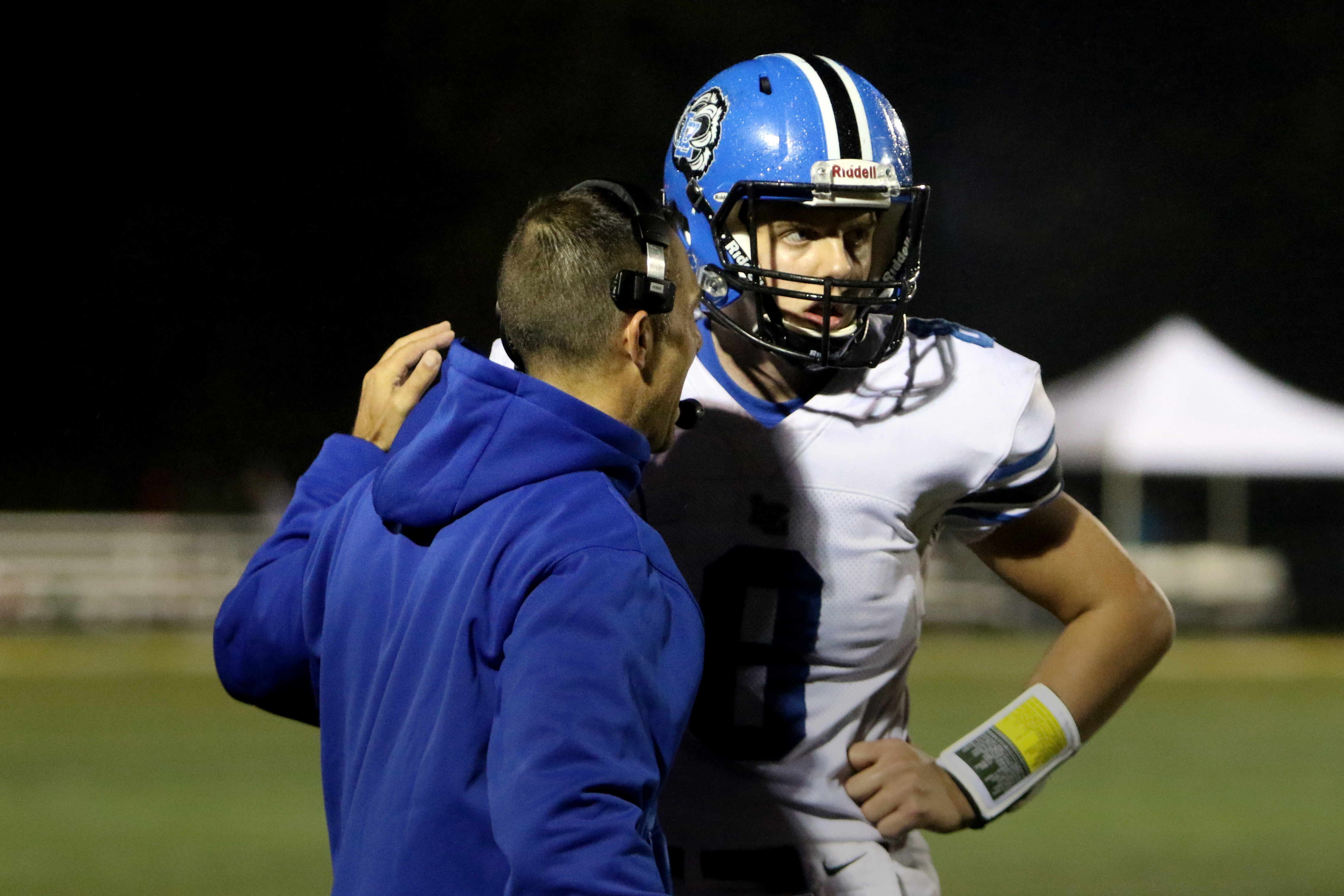 Day after day, throughout the season, this approach makes an impression. On rare days when I don’t hang up the posters, players will ask about them. We refer to them often during scrimmage play, when I stop play to talk, or when we speak afterward about what the players were thinking and doing during a particular game situation. I also remind them of these slogans when coaching during matches. I might tell them to “love the battle, and solve the puzzle,” or reinforce “no excuses.”
Day after day, throughout the season, this approach makes an impression. On rare days when I don’t hang up the posters, players will ask about them. We refer to them often during scrimmage play, when I stop play to talk, or when we speak afterward about what the players were thinking and doing during a particular game situation. I also remind them of these slogans when coaching during matches. I might tell them to “love the battle, and solve the puzzle,” or reinforce “no excuses.”
Our program has two “excuse boxes” — one for average-size excuses (“I can’t play when it’s so windy!”), and a bigger box for supersized excuses (“I’m just terrible!”). I tell players to write down their excuses, crumple them up, and throw them in the box. Sometimes, they sit or stand at the big box to just get a full-body cleansing from their excuses. Oftentimes, they emerge laughing, feeling better about themselves and ready to refocus.
These principles are rooted in sport and psychological science, and I’ve found they resonate with my players. It helps them feel calmer, have more fun, compete better and grow as people. I don’t claim they’ll become champions on the court. I just tell them if they develop these tips into real habits, they’ll enjoy the game more, and they’ll grow as players and as people. They’ll act like champions, no matter the results.
» RELATED: Mental keys to athletic improvement and achievement
How much do you, as a coach, emphasize these things, not just to your players and assistant coaches, but also to your parents? How much do you, as an athletic director, expect your coaches to create written coaching philosophies that lay out expectations and principles? Do you expect your coaching staff to really teach these kinds of principles, and not just give them lip service?
In tennis, we have situations, like always awarding close line calls in favor of your opponent, that are meant to teach and maintain honor. Are there ways you can promote that same “give the opponent the benefit of the doubt” in your sport? Are you a coach whom your kids, assistants, and parents know would rather lose with honor than win by bending the rules or codes of your sport? Do you, as an athletic administrator, celebrate winning more than effort and character, or do effort, improvement, and character get equal or higher billing?
Compete-Learn-Honor doesn’t guarantee winning, and it won’t work for every player. No coaching philosophy can do either of those things. But if you teach it intentionally and repeatedly, it will give your players a better shot at competing at their best, and at becoming the kind of people you and your school can be proud of.
Dr. Peter C. Scales is an internationally known positive youth development psychologist, US Professional Tennis Association-certified tennis teaching pro, and head JV tennis coach for boys and girls teams at Parkway South High in Missouri. He can be found at www.drpeterscales.com.


